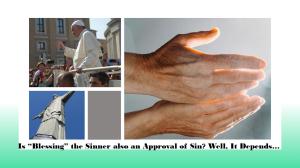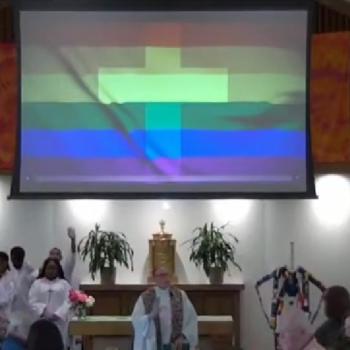We live in a fascinating time of Church history. Some on the Left side of the ideological spectrum think Pope Francis is open to the possibility of blessing same-sex unions. Moreover, some on the Right also see this same openness on the part of the Pope, yet they decry it as another indication of the chaos surrounding the Francis papacy. Still others, including me, think the Pope is not open to blessing same-sex union. However, the language Pope Francis uses, not to mention his actions regarding activist LGBTQ groups, present a context in which confusion flourishes. This confusion, sadly, opens the door for possible abuses.
The Pope advocates the blessing of persons (the sinners), not the same-sex unions (the sin). However, are there situations where blessing of persons constitutes an inference to blessing of their sin? Let’s explore this idea below.
Blessing of Persons
Some commentators contend, and rightly so, that Pope Francis meant the blessing of persons, not same-sex unions, in his response to the dubia cardinals in July. For example, Dawn Eden Goldstein, in a recent article for Where Peter Is, states:
Three times the Holy Father emphasizes that, to grow in our walk with God, we need grace to help us “live better.” He has already said that the Church can in no way permit a blessing that would “suggest that something that is not marriage is recognized as marriage.” So he is not speaking here of the blessing of a sexual union. He is speaking rather of a situation in which individuals seek a blessing to help them grow in their walk with God.
Now, Goldstein goes on to state such blessings of the Pope offers are to “live up to the demands of the Gospel,” or to live a holy life. So far, so good…
Blessing Unto Repentance
Likewise, fellow Patheos blogger, Henry Karlson, in a recent article titled Blessings And Sinners, stressed that the blessing of a person does not equate to the blessing of sin. He observes:
God doesn’t wait for us to repent, nor does God wait for us to realize we are in need of grace to shower us with it. God’s gift of grace comes first, and through that blessing, we are able to be enlightened, even if a little, and receive what we need so that we can then cooperate with grace and begin our long journey to sainthood.
And
Sadly, it seems many Christians only want God to curse sinners, to be a retributive judge who damns people for their sins. That is, they do not want sinners to ever receiving God’s blessings in their lives, for they think, in doing so, it means God would be blessing sin. But the whole point is that God comes to those who are lost and blesses them so that they can repent and become who and what God made them to be. Without God first coming to bless sinners, sinners would never change.
Karlson’s spot on of the need of God to come to those in need of His blessing to, in turn, respond to this blessing with repentance and the start of a journey towards sainthood.
Of course, the caveat in both the Goldstein and Karlson articles involve the blessing leading to holiness (the demands of the Gospel) and repentance. But what if those who receive the blessing harbor no intention for holiness or repentance? What if they desire approval and acceptance? Does the Church bless anyway? And if so, does such a blessing infer the blessing of sin?
Seeking Approval Through Blessings
Writing for the Federalist, John Daniel Davidson, in his article, All Christians, Not Just Catholics, Should Be Worried About Pope Francis’ Synod, contends:
Every such child also knows that when most people request a blessing they aren’t making a “plea for a better life” but seeking approval, endorsement, and affirmation. That’s the common understanding of the thing, which Pope Francis bends over backward to avoid here.
Mr. Davidson makes a valid point. When a potential groom approaches a future father-in-law for his “blessing” to marry his daughter, he hopes for approval and affirmation, not a “plea for a better life.”
Furthermore, for many, a meeting with the Pope constitutes as a sort of blessing, and affirmation of one’s life and work. Sr. Jeannine Gramick and Francis DeBernardo of New Ways Ministry hold this view concerning their recent visit with the Holy Father. In a statement released on their website. Mr. DeBernardo stated:
This meeting was an affirmation not only of Sister Jeannine and New Ways Ministry but of the thousands upon thousands of LGBTQ+ people, parishes, schools, pastoral ministers, and religious communities who have been tirelessly working for equality, and who often experienced the great disapproval and ostracization that New Ways Ministry had experienced.
Meeting with Pope Francis is a great encouragement for Sister Jeannine and New Ways Ministry to continue our work in the Catholic Church.
Clearly, this group sees the meeting with Pope Francis as an “affirmation” and “a great encouragement”—in other words, a blessing.
The Blessing of Jacob
All this talk of blessing and affirmation recalls the story of Jacob stealing his brother Esau’s blessing as the elder sibling of their father Isacc. Find the full account here. In the story, an elderly Isaac, almost blind and about to die, calls his eldest son Esau to him. He requests that Esau go hunting, prepare the food he catches, and bring it to Isaac to eat. Isaac tells Esau that after the meal, he will impart a blessing. Hearing this, Rebekah, who favored Jacob, advises him to trick Isaac into blessing him instead of Esau. After some elaborate subterfuge, Jacob pulls off the ruse and receives the blessing. Later, Esau enters his father’s tent with food.
“Let my father arise and eat of his son’s game, that you may bless me.” His father Isaac said to him, “Who are you?” He answered, “I am your son, your firstborn, Esau.” Then Isaac trembled very violently and said, “Who was it then that hunted game and brought it to me, and I ate it all before you came, and I have blessed him? Yes, and he shall be blessed.” [Genesis 27:31-33]
So, a blessing acquired through deceit still counts as a blessing in the above story of Esau and Jacob. Now, the blessing in no way justifies the deceit, nor affirms the actions of Jacob in stealing his brother’s blessing. The blessing above also does not involve an admonition to “live better,” holier, or penitently. Rebekah and Jacob desired the power of Isaac’s blessing. Rebekah desired the affirmation and acceptance of her favored son, Jacob, and used deception to get it. Some within the Church wish to deceptively approach the Church for a blessing (affirmation and acceptance), as Jacob did with Isaac, hoping that she, too, is blind.
Final Thoughts…
In conclusion, as witnessed in the writings of Pope Francis, demonstrated in the blessing of Jacob over Esau, and confirmed by the likes of others (Goldstein, Karlson, and me), such a blessing in this context cannot happen except in cases of illicit abuse. Moreover, those wishing for a blessing within the context of living out “the demands of the Gospel” and repentance, regardless of their current situations or state of their soul, we all say “come!” Come to the Father of mercy and forgiveness. Come and receive the gift of redemption and a new life.
What ought the faithful do?
- Pray for the Church and the Holy Father.
- Practice constant vigilance against possible abuses.
- Stay informed and up to date on the Synod and the Holy See.
- Don’t lose hope (this one I struggle with).
- Trust in God.
Finally, let’s not forget that St. Athanasius once stood as the only bishop in the Eastern Church not to succumb to the heresy of Arianism. This reality led to the moniker: Athanasius Contra Mundum (Athanasius against the world).
Given our current confusion, St. Athanasius, pray for us.
Thank you!
Read The Latin Right’s other writing here.














